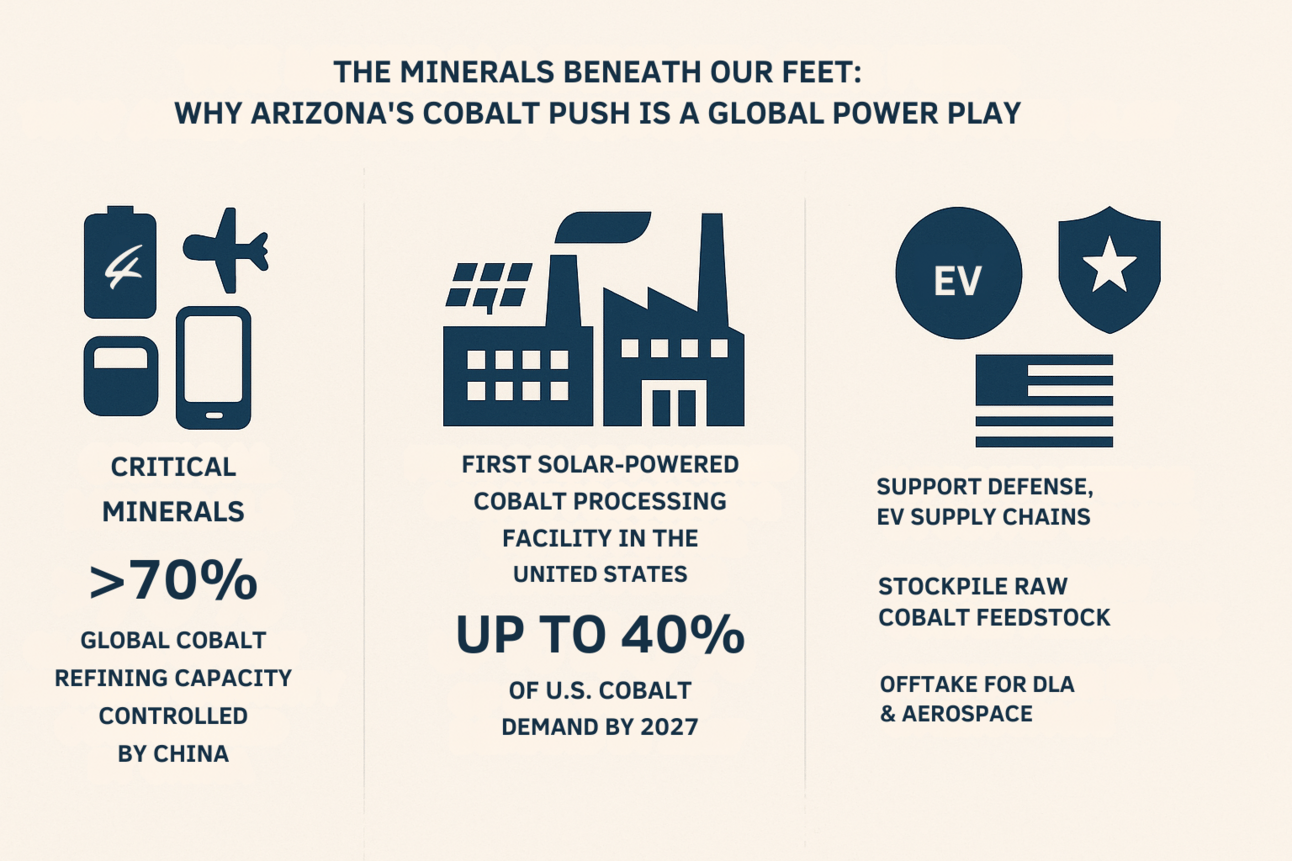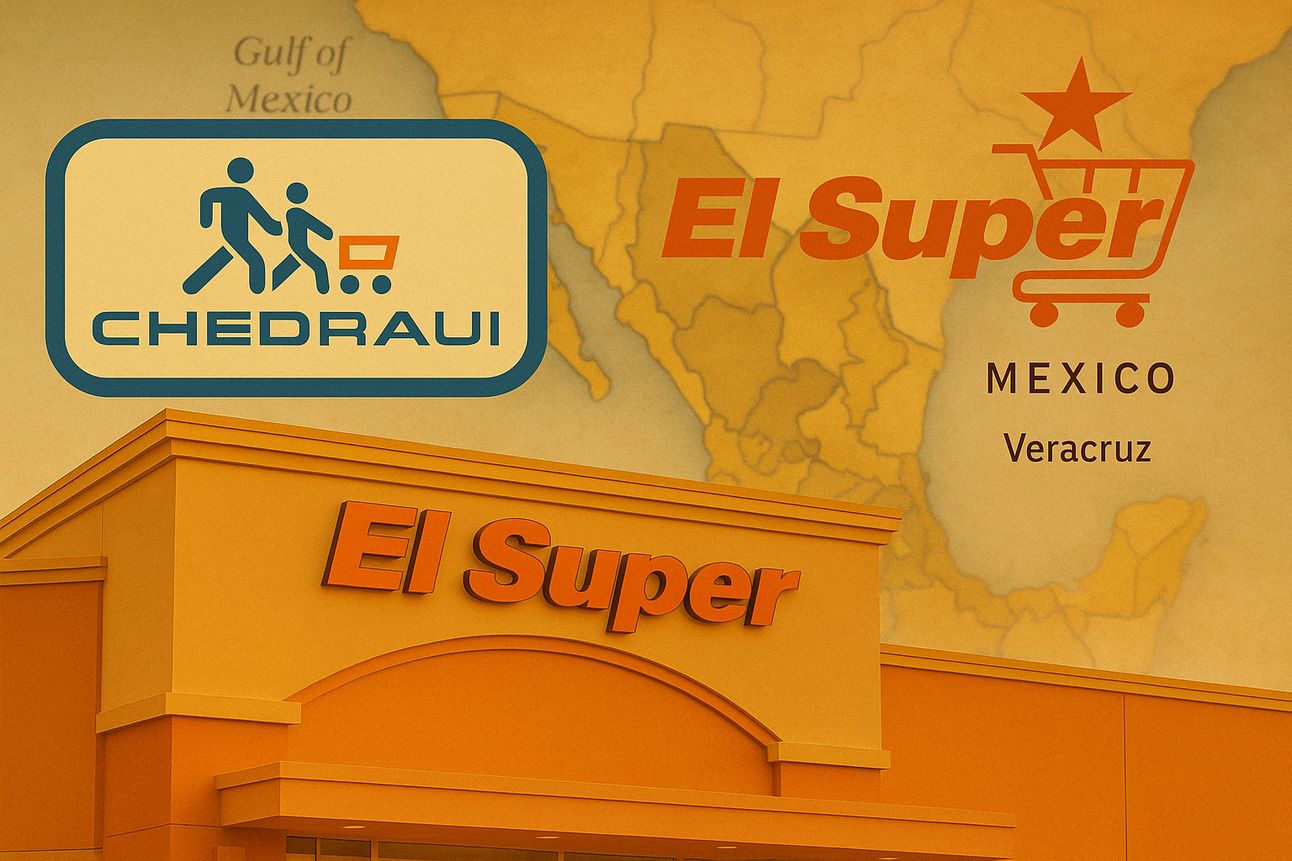In Memorium: Pope Francis
Many of you may just be learning that Pope Francis, a moral and spiritual compass for millions, passed away this morning at the age of 88. I was deeply saddened by the news. His life was defined by humility, courage, and a deep commitment to the poor, the marginalized, and the promise of reform. As someone who has spent a career moving between the worlds of public service, business, and border communities, I often found his words grounding—especially his call to see dignity in every person, and to lead with empathy. His legacy is a reminder that moral clarity and quiet strength can still shape global discourse. He will be missed. May he rest in eternal peace. ✞🕊️
What’s New This Week
{{Firstname|Good morning}}, this week, we spotlight the forces shaping the future of North America—beginning in Arizona, where a bold new cobalt project is helping to redefine the landscape of energy independence and national security. At the same time, immigrant families are being forced to make heartbreaking choices under the pressure of deportation threats, while cross-border entrepreneurs like the Chedraui family offer a powerful reminder that resilience and prosperity come not from isolation, but from connection, vision, and shared opportunity.
First time reading? Join thousands of intellectually curious readers. Sign up here.
Inside Special Sections
Trade Winds: From frankincense to free trade—how faith, tradition, and commerce have always been connected, and why the U.S.-Mexico corridor still carries that sacred energy.
Power Move: Arizona's cobalt facility is more than clean-tech—it's a national security strategy. Here's how Intermestic Capital is helping lead the charge.
The Border Buzz: The Chedraui family's rise from Veracruz to U.S. supermarkets proves that visionary entrepreneurs still thrive across borders—even amid trade wars.
The Quick Courier
Supreme Court Hits Pause on Alien Enemies Act Deportations
In a dramatic late-night decision, the Court halted Trump’s mass deportations under a centuries-old wartime law—fueling a legal firestorm over due process, executive power, and the future of immigration enforcement.
Leaving Before They're Taken
Faced with the threat of being publicly rounded up, some immigrants are choosing to leave the U.S. quietly—revealing the chilling impact of Trump’s deportation rhetoric before any policy even takes effect.
Dreams on the Edge
As legal protections hang by a thread, DACA recipients now face renewed threats of deportation—turning lives once rooted in hope into targets of political crossfire.
Golden Escape Plans
With political uncertainty rising, more Americans are eyeing “golden visa” programs abroad—trading red tape at home for residency through investment overseas.
Cartels on Notice
In a bold show of force, the U.S. Navy has redeployed the USS Stockdale to the southern border—signaling that cartel activity is now seen not just as crime, but as a national security threat.
Trade Winds
From Frankincense to Free Trade: The Sacred Roots of Global Commerce

Ancient Trade Routes
As the world emerged from Holy Week and families gathered to celebrate Easter, I found myself reflecting on something that often gets overlooked in today’s fast-moving world: how spiritual traditions and commerce have always gone hand in hand.
Long before digital platforms and global supply chains, trade was a deeply human act—powered by faith, necessity, and discovery. Consider the ancient Incense Route, where merchants carried frankincense and myrrh from Arabia to Jerusalem, or the Silk Road, which moved silk, spices, and sacred knowledge from East Asia to the Mediterranean. These weren’t just economic exchanges—they were gateways for cultural, religious, and spiritual transmission.
In fact, the gifts brought by the three Magi—gold, frankincense, and myrrh—were not just symbolic. They were prized trade goods, transported across thousands of miles and traded in markets where faith and commerce met.
Fast forward to today, and I believe that same energy lives on in the corridors between the U.S. and Mexico. Take Nogales, a city I once served as mayor. Every year during Semana Santa, local economies experience a pulse of cross-border movement—families traveling, vendors selling candles and flowers, and increased demand for food, drink, and celebration. What we often see as "holiday commerce" is really a continuation of a deeper tradition—commerce that reflects our values, our faith, and our need to connect.
Even in sectors like semiconductors, agriculture, or clean energy, the principles hold true. Trade is more than a transaction—it’s a relationship. It builds trust, creates interdependence, and allows ideas to cross borders just as surely as cargo does.
At Intermestic Partners, we approach every project with this mindset. Whether we’re financing a cobalt processing plant in Yuma or helping connect investors to opportunity through EB-5, our mission is grounded in the idea that trade isn’t just about profit—it’s about purpose.
This Easter season reminds us that resurrection is possible—and so is renewal. As we look ahead to the challenges of the global economy, we’d do well to revisit the spiritual and cultural underpinnings of commerce. Because in the end, whether you're trading spices or semiconductors, the most valuable thing exchanged is trust.
As someone who grew up at the border and built bridges across government, business, and faith, I’ve seen firsthand how trade is more than logistics—it’s about honoring people, stories, and traditions that stretch across generations.
Power Move
The Minerals Beneath Our Feet: Why Arizona’s Cobalt Push Is a Global Power Play

America has a critical minerals problem
It’s becoming increasingly clear: America has a critical minerals problem.
From lithium-ion batteries to fighter jets, the U.S. economy—and its national security—depends on materials like cobalt, lithium, and rare earth elements. And yet, China currently dominates more than 70% of global cobalt refining capacity. That’s not just an economic imbalance. It’s a strategic vulnerability.
That’s why building the first solar-powered cobalt processing facility in the United States—right here in Yuma County, Arizona—is more than a milestone. It’s a power move.
EVelution Energy, in partnership with Intermestic Capital, is building the nation’s first solar-powered cobalt processing facility—set to meet up to 40% of the United States’ cobalt sulfate and cobalt metal demand by 2027. Located in Yuma County, AZ, the sunniest region in America, the facility will not only advance our clean energy goals but also serve as a strategic cornerstone in decoupling U.S. defense and electric vehicle supply chains from Chinese-controlled mineral dependencies.
What makes this a true power move is what’s coming next. As global demand for cobalt accelerates and national security priorities shift, strategic plans are underway to enhance supply chain resilience and ensure long-term access for critical industries like defense and aerospace. The groundwork being laid today will position Arizona—and the U.S.—as a reliable, independent hub for critical mineral processing.
From local TV news in Yuma to national trade media, people are starting to realize: this is the right project at the right time. The U.S. must build mineral independence to ensure energy resilience, industrial competitiveness, and geopolitical leverage.
In Arizona, we’re not just making progress—we’re laying the foundation for a new era of North American strength. And we’re doing it with clean power, local partnerships, and international vision.
The Border Buzz
From Veracruz to California: The Chedraui Family Legacy That Crossed Borders and Built an Empire

Cross-Border Commerce, Local Flavor
In a time when trade wars dominate headlines and tariffs threaten to disrupt supply chains, it’s worth remembering something essential: visionary entrepreneurs don’t wait for perfect conditions—they build anyway.
That’s the story of José Ramón and José Antonio Chedraui, two friends I know personally, whose family has built one of the most inspiring cross-border business success stories of our time.
Grupo Chedraui began in Veracruz, Mexico in 1927, when Lebanese-Mexican immigrant Lázaro Chedraui opened a small haberdashery. Nearly a century later, what started as “El Puerto de Veracruz” has transformed into a retail powerhouse that now stretches across both Mexico and the United States, including El Super, a growing supermarket chain with locations across California, Arizona, Nevada, New Mexico, and beyond.
Their stores cater to communities that are often overlooked—immigrant families, first-generation entrepreneurs, and everyday consumers looking for authenticity. When I shop at El Super, I don’t just go for the regional spices, fresh tortillas, or the papayas flown in from Michoacán. I go because it feels personal. Because I know the family behind the name. Because I believe in supporting businesses that understand the communities they serve.
People often ask me, “How can I support local entrepreneurship?” Start by being intentional with your purchases. Choose to support stores like El Super. Behind every shelf is a story—of risk, resilience, and a relentless belief that our shared culture can also be our greatest economic advantage.
While Washington debates tariffs and China recalibrates its export policies, entrepreneurs like the Chedrauis continue to build bridges, not walls. They prove that cross-border success isn’t a loophole in the system—it’s the heart of North America’s promise.
And for those of us who care about where our food comes from, who we empower, and what kind of economy we want to build—supporting families like theirs is a great place to start.
Power Poll
Do you believe the U.S. should create a more streamlined legal pathway for immigrant workers in essential industries like agriculture and manufacturing?
Join the Conversation
Thanks for reading this edition of my newsletter! I'd love to hear from you. Share your thoughts about what you think are the most critical issues that need to be addressed. Email me at [email protected] or connect with me on social media using the hashtag #Intermestic.
Stay Informed, Stay Connected!
Subscribe to my blog at www.marcolopez.com.
Follow me on X, LinkedIn, and Facebook for the latest news and updates.
Share this newsletter with your network and help spread the word!
Let's keep the conversation going!